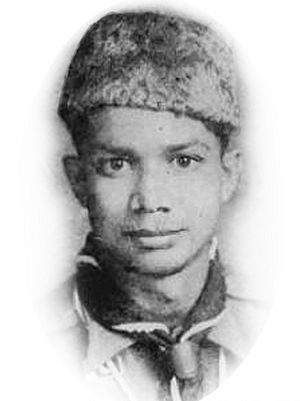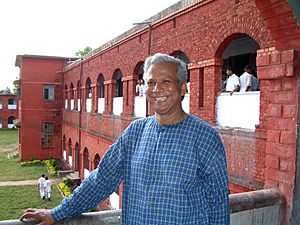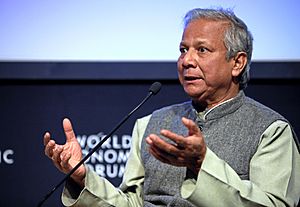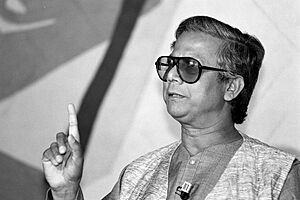Muhammad Yunus facts for kids
Quick facts for kids
Muhammad Yunus
|
|
|---|---|
|
মুহাম্মদ ইউনূস
|
|

Yunus in 2013
|
|
| 5th Chief Adviser of Bangladesh | |
| Assumed office 8 August 2024 |
|
| President | Mohammed Shahabuddin |
| Preceded by | Sheikh Hasina (as Prime Minister) |
| Adviser of the Caretaker Government | |
| In office 30 March 1996 – 23 June 1996 |
|
| President | Abdur Rahman Biswas |
| Chief Adviser | Muhammad Habibur Rahman |
| Personal details | |
| Born | 28 June 1940 Hathazari, Bengal Province, British India |
| Citizenship |
|
| Political party | Independent (2007–present) |
| Other political affiliations |
Nagorik Shakti (2007) |
| Spouses |
|
| Children |
|
| Relatives | Muhammad Ibrahim (brother) |
| Residences | Jamuna State House, Dhaka |
| Education |
|
| Occupation |
|
| Awards |
|
| Signature |  |
|
Notable work
|
|
| Scientific career | |
| Institutions |
|
Muhammad Yunus (born 28 June 1940) is a Bangladeshi economist, entrepreneur, politician, and civil society leader, who has been serving as Chief Adviser of the Interim Government of Bangladesh since 8 August 2024. Yunus was awarded the Nobel Peace Prize in 2006 for founding the Grameen Bank and pioneering the concepts of microcredit and microfinance. Yunus has received several other national and international honors, including the United States Presidential Medal of Freedom in 2009 and the Congressional Gold Medal in 2010. Yunus is one of only seven people in the world to have received all of these awards.
In 2012, Yunus became Chancellor of Glasgow Caledonian University in Scotland, a position he held until 2018. Previously, he was a professor of economics at Chittagong University in Bangladesh. He published several books related to his finance work. He is a founding board member of Grameen America and Grameen Foundation, which support microcredit. Yunus also served on the board of directors of the United Nations Foundation, a public charity to support UN causes, from 1998 to 2021. In 2022, he partnered with Global Esports Federation as part of the Esports for Development (E4D) movement to support the development of Esports.
Following the overthrow of Sheikh Hasina, President Mohammed Shahabuddin gave Yunus a mandate to form an interim government, acceding to calls from student leaders for his appointment. His government has appointed a Constitutional Reform Commission to draft a revision to the Constitution of Bangladesh and has pledged the convocation of a constituent assembly. His acquittal on appeal the following day of charges of labour code violations, which were viewed as politically motivated, facilitated his return to the country and appointment. His name was listed in The 500 Most Influential Muslims in 2024.
Contents
Early life and education
Early years
The third of nine children, Muhammad Yunus was born on 28 June 1940 to a Bengali Muslim family of Saudagars in the village of Bathua, by the Kaptai road at Hathazari in the Chittagong District of Bengal Presidency (now in Bangladesh). His father was Haji Muhammad Dula Mia Soudagar, a jeweller, and his mother was Sufia Khatun. His early childhood was spent in the village. In 1944, his family moved to the city of Chittagong, and he moved from his village school to Lamabazar Primary School. By 1949, his mother was afflicted with psychological illness. Later, he passed the matriculation examination from Chittagong Collegiate School ranking 16th out of 39,000 students in East Pakistan. During his school years, he was an active Boy Scout, and travelled to West Pakistan and India in 1952, and to Canada in 1955 to attend Jamborees. Later, while Yunus was studying at Chittagong College, he became active in cultural activities and won awards for drama. In 1957, he enrolled in the Department of Economics at Dhaka University and completed his BA in 1960 and MA in 1961.
After graduation
After his graduation, Yunus joined the Bureau of Economics as a research assistant to the economics researches of Nurul Islam and Rehman Sobhan. Later, he was appointed lecturer in economics in Chittagong College in 1961. During that time, he also set up a profitable packaging factory on the side. In 1965, he received a Fulbright scholarship to study in the United States. He obtained his PhD in economics from the Vanderbilt University Graduate Program in Economic Development (GPED) in 1971. From 1969 to 1972, Yunus was the assistant professor of economics at Middle Tennessee State University in Murfreesboro.
During the Bangladesh Liberation War in 1971, Yunus founded a citizen's committee and ran the Bangladesh Information Center, with other Bangladeshis in the United States, to raise support for liberation. He also published the Bangladesh Newsletter from his home in Nashville. After the War, he returned to Bangladesh and was appointed to the government's Planning Commission headed by Nurul Islam. However, he found the job boring and resigned to join Chittagong University as head of the Economics department. After observing the famine of 1974, he became involved in poverty reduction and established a rural economic programme as a research project. In 1975, he developed a Nabajug Tebhaga Khamar (lit. New Era Three-share Farm) which the government adopted as the Packaged Input Programme. To make the project more effective, Yunus and his associates proposed the Gram Sarkar (lit. Village government) programme. Introduced by President Ziaur Rahman in the late 1970s, the government formed 40,392 village governments as a fourth layer of government in 2003. On 2 August 2005, in response to a petition by Bangladesh Legal Aid and Services Trust (BLAST), the High Court declared village governments illegal and unconstitutional.
His concept of microcredit for supporting innovators in multiple developing countries also inspired programmes such as the Info lady Social Entrepreneurship Programme.
Early career
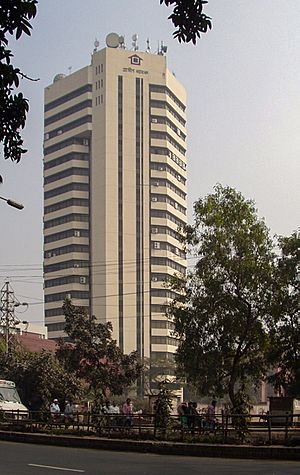
In 1976, during visits to the poorest households in the village of Jobra near Chittagong University, Yunus discovered that very small loans could make a disproportionate difference to a poor person. Village women who made bamboo furniture had to take usurious loans to buy bamboo, and repay their profits to the lenders. Traditional banks did not want to make tiny loans at reasonable interest to the poor due to high risk of default. But Yunus believed that, given the chance, the poor will not need to pay high interest on the money, can keep any profits from their own labour, and hence microcredit was a viable business model. Yunus lent US$27 of his money to 42 women in the village, who made a profit of BDT 0.50 (US$0.02) each on the loan. Thus, Yunus is credited with the idea of microcredit.
In December 1976, Yunus finally secured a loan from the government Janata Bank to lend to the poor in Jobra. The institution continued to operate, securing loans from other banks for its projects. By 1982, it had 28,000 members. On 1 October 1983, the pilot project began operation as a full-fledged bank for poor Bangladeshis and was renamed Grameen Bank ("Village Bank"). By July 2007, Grameen had issued US$6.38 billion to 7.4 million borrowers. To ensure repayment, the bank uses a system of "solidarity groups". These small informal groups apply together for loans and its members act as co-guarantors of repayment and support one another's efforts at economic self-advancement.
In the late 1980s, Grameen started to diversify by attending to underutilized fishing ponds and irrigation pumps like deep tube wells. In 1989, these diversified interests started growing into separate organisations. The fisheries project became Grameen Motsho ("Grameen Fisheries Foundation") and the irrigation project became Grameen Krishi ("Grameen Agriculture Foundation"). In time, the Grameen initiative grew into a multi-faceted group of profitable and non-profit ventures, including major projects like Grameen Trust and Grameen Fund, which runs equity projects like Grameen Software Limited, Grameen CyberNet Limited, and Grameen Knitwear Limited, as well as Grameen Telecom, which has a stake in Grameenphone (GP), the biggest private phone company in Bangladesh. From its start in March 1997 to 2007, GP's Village Phone (Polli Phone) project had brought cell-phone ownership to 260,000 rural poor in over 50,000 villages.
The success of the Grameen microfinance model inspired similar efforts in about 100 developing countries and even in developed countries including the United States. Many microcredit projects retain Grameen's emphasis of lending to women. More than 94% of Grameen loans have gone to women, who suffer disproportionately from poverty and who are more likely than men to devote their earnings to their families.
For his work with Grameen, Yunus was named an Ashoka: Innovators for the Public Global Academy Member in 2001. According to Rashidul Bari, the Grameen's social business model has gone from being theory to an inspiring practice adopted globally by leading universities, entrepreneurs, social business and corporations.
Political career
In July 2007, in Johannesburg, South Africa, Nelson Mandela, Graça Machel and Desmond Tutu convened a group of world leaders "to contribute their wisdom, independent leadership and integrity to tackle some of the world's toughest problems." Nelson Mandela announced the formation of this new group, The Elders, in a speech he delivered on the occasion of his 89th birthday. Yunus attended the launch of the group and was one of its founding members. He stepped down as an Elder in September 2009, stating that he was unable to do justice to his membership due to the demands of his work.
Yunus is a member of the Africa Progress Panel (APP), a group of ten distinguished individuals who advocate at the highest levels for equitable and sustainable development in Africa. Every year, the Panel releases a report, the Africa Progress Report, that outlines an issue of immediate importance to the continent and suggests a set of associated policies. In July 2009, Yunus became a member of the SNV Netherlands Development Organisation International Advisory Board to support the organisation's poverty reduction work. Since 2010, Yunus has served as a Commissioner for the Broadband Commission for Digital Development, a UN initiative which seeks to use broadband internet services to accelerate social and economic development. In March 2016, he was appointed by United Nations Secretary-General Ban Ki-moon to the High-Level Commission on Health Employment and Economic Growth, which was co-chaired by presidents François Hollande of France and Jacob Zuma of South Africa. Following the Rohingya genocide in 2016–2017, Yunus urged Myanmar to end violence against Rohingya Muslims.
Advisor to the Caretaker Government
In 1996, Muhammad Yunus served as an advisor to the caretaker government led by former Chief Justice Muhammad Habibur Rahman. He was responsible for overseeing the Ministry of Primary and Mass Education, the Ministry of Science and Technology, and the Ministry of Environment and Forests.

Nagorik Shakti
In early 2006, Yunus, along with other members of the civil society including Rehman Sobhan, Muhammad Habibur Rahman, Kamal Hossain, Matiur Rahman, Mahfuz Anam and Debapriya Bhattacharya, participated in a campaign for honest and clean candidates in national elections. He considered entering politics in the later part of that year. On 11 February 2007, Yunus wrote an open letter, published in the Bangladeshi newspaper Daily Star, where he asked citizens for views on his plan to float a political party to establish political goodwill, proper leadership and good governance. In the letter, he called on everyone to briefly outline how he should go about the task and how they can contribute to it. Yunus finally announced that he is willing to launch a political party tentatively called Nagorik Shakti (lit. Citizens' Power) on 18 February 2007. There was speculation that the army supported a move by Yunus into politics. On 3 May, however, Yunus declared that he had decided to abandon his political plans following a meeting with the head of the caretaker government, Fakhruddin Ahmed.
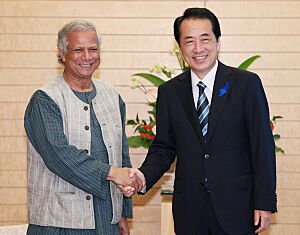
Chief Adviser of Bangladesh
Amid the Student–People's uprising in Bangladesh, Yunus expressed support for the students and his distaste of the current government, and in August 2024, after the resignation of Sheikh Hasina and her departure to India, it was announced that Yunus would be chief adviser of the interim government.
Muhammad Yunus was appointed as the transitional leader of the interim government on 7 August 2024 by president Mohammed Shahabuddin. On 8 August 2024, he took the oath and has been serving as the Chief Advisor of the interim government. After the oath, he visited injured people in Dhaka Medical College. On 10 August 2024, he visited the home and family members of Abu Sayed. He also visited injured student protesters in the Rangpur Medical College. Following communal violence after Hasina's resignation, Yunus threatened to resign if the violence continued and vowed to crack down on conspirators of the attacks.

As Chief Adviser, Yunus has pledged to continue providing humanitarian aid to Rohingya refugees in Bangladesh and support the garment industry amid disruptions caused by the unrest prior to his appointment.

On 16 December 2024, Yunus announced that general elections would be held in late 2025 or early 2026.
Personal life
Yunus belongs to a Muslim family. In 1967, while Yunus attended Vanderbilt University, he met Vera Forostenko, a student of Russian literature at Vanderbilt University and daughter of Russian immigrants to Trenton, New Jersey, United States. They were married in 1970. Yunus's marriage with Vera ended within months of the birth of their baby girl, Monica Yunus, in 1979 in Chittagong, as Vera returned to New Jersey claiming that Bangladesh was not a good place to raise a baby. Monica Yunus became an operatic soprano based in New York City. Yunus later married Afrozi Yunus, who was then a researcher in physics at Manchester University. She was later appointed as a professor of physics at Jahangirnagar University. Their daughter Deena Afroz Yunus was born in 1986.
Yunus's brother Muhammad Ibrahim is a former professor of physics at the University of Dhaka and the founder of The Center for Mass Education in Science (CMES), which brings science education to adolescent girls in villages. His other brother Muhammad Jahangir (d. 2019) was a television presenter and a social activist in Bangladesh.
Yunus Centre
The Yunus Centre, located in Dhaka, Bangladesh, is a think tank focused on social business, poverty alleviation, and sustainability. Founded in 2008 and chaired by Dr Yunus, it promotes his philosophy of social business and serves as a resource center for related initiatives. The centre's activities include poverty eradication campaigns, research and publications, support for social business start-ups, organizing the Global Social Business Summit, and developing academic programs on social business with international universities.
Documentaries
- 2000 – Sixteen Decisions
- 2010 – To Catch a Dollar
- 2011 – Bonsai People – The Vision of Muhammad Yunus directed by Holly Mosher
Awards and recognitions
Yunus was awarded the 2006 Nobel Peace Prize, along with Grameen Bank, for their efforts to create economic and social development:
Muhammad Yunus has shown himself to be a leader who has managed to translate visions into practical action for the benefit of millions of people, not only in Bangladesh, but also in many other countries. Loans to poor people without any financial security had appeared to be an impossible idea. From modest beginnings three decades ago, Yunus has, first and foremost through Grameen Bank, developed micro-credit into an ever more important instrument in the struggle against poverty.

Yunus was the first Bangladeshi to ever get a Nobel Prize. He established Grameen Bank in 1983, which plays a significant role in poverty alleviation in various countries of the world including Bangladesh. In 2006, he and the Grameen Bank he founded jointly won the Nobel Peace Prize. After receiving the news of the important award, Yunus announced that he would use part of his share of the $1.4 million (equivalent to $2.03 million in 2022) award money to create a company to make low-cost, high-nutrition food for the poor; while the rest would go towards establishing the Yunus Science and Technology University in his home district as well as setting up an eye hospital for the poor in Bangladesh.
Former U.S. president Bill Clinton was a vocal advocate for the awarding of the Nobel Prize to Yunus. He expressed this in Rolling Stone magazine as well as in his autobiography My Life. In a speech given at University of California, Berkeley in 2002, President Clinton described Yunus as "a man who long ago should have won the Nobel Prize [in Economics and] I'll keep saying that until they finally give it to him." Conversely, The Economist stated explicitly that while Yunus was doing excellent work to fight poverty, it was not appropriate to award him the Peace Prize, stating: "... the Nobel committee could have made a braver, more difficult, choice by declaring that there would be no recipient at all."
He is one of only seven persons to have won the Nobel Peace Prize, Presidential Medal of Freedom, and the Congressional Gold Medal. Other notable awards include the Ramon Magsaysay Award in 1984, the World Food Prize, the International Simon Bolivar Prize (1996), the Prince of Asturias Award for Concord and the Sydney Peace Prize in 1998, and the Seoul Peace Prize in 2006. Additionally, Yunus has been awarded 50 honorary doctorate degrees from universities across 20 countries, and 113 international awards from 26 countries including state honours from 10 countries. Bangladesh government brought out a commemorative stamp to honour his Nobel Award.
Yunus was named by Fortune Magazine in March 2012 as one of 12 greatest entrepreneurs of the current era. In its citation, Fortune Magazine said "Yunus' idea inspired countless numbers of young people to devote themselves to social causes all over the world."
In January 2008, Houston, Texas declared 14 January as "Muhammad Yunus Day".
Yunus was named among the most desired thinkers the world should listen to by the FP 100 (world's most influential elite) in the December 2009 issue of Foreign Policy magazine.
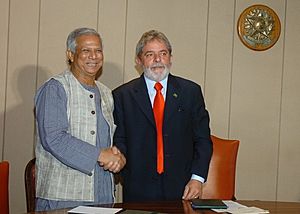
In 2010, the British magazine New Statesman listed Yunus at 40th in the list of "The World's 50 Most Influential Figures 2010".
Yunus received 50 honorary doctorate degrees from universities from Argentina, Australia, Bangladesh, Belgium, Canada, Costa Rica, India, Italy, Japan, Korea, Lebanon, Malaysia, Peru, Russia, South Africa, Spain, Thailand, Turkey, the UK, and the US. United Nations Secretary-General Ban Ki-moon invited Yunus to serve as an MDG Advocate. Yunus sits on the Board of United Nations Foundation, Schwab Foundation, Prince Albert II of Monaco Foundation, Grameen Credit Agricole Microcredit Foundation. He has been a member of Fondation Chirac's honour committee, ever since the foundation was launched in 2008 by former French president Jacques Chirac in order to promote world peace.
Yunus has become a well-known international figure. He has delivered numerous lectures around the world, and has appeared on popular television shows, including The Daily Show with Jon Stewart and The Oprah Winfrey Show in 2006, The Colbert Report in 2008, Real Time with Bill Maher in 2009 and The Simpsons in 2010. On Google+, Yunus was one of the most followed people worldwide, with over two million followers until Google closed its operations in 2019.
He has played a key advisory role in the Paris 2024 Olympics, promoting social business principles and encouraging sustainable, socially responsible projects. His influence led to initiatives like prioritizing social businesses in public tenders and integrating social housing into the athletes' village redevelopment.
See also
 In Spanish: Muhammad Yunus para niños
In Spanish: Muhammad Yunus para niños
- Yunus Centre
- Yunus Social Business
- List of chief advisers of Bangladesh
- List of Nobel Peace Prize laureates


